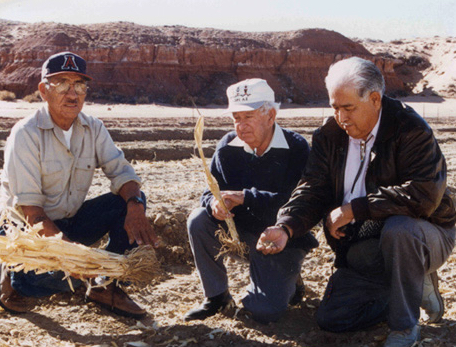
Goal: To develop state-of-the-art capabilities for sustained desert agricultural production and marketing on the Hopi Reservation, and in other arid regions of North America.
Traditional subsistence farming on the Hopi Indian Reservation in northeastern Arizona is no longer economically viable. High unemployment has prompted many young Hopis to leave, further eroding Hopi culture and tradition. Hopi leaders have sought to reinvigorate agriculture on the Reservation, hoping to continue their land traditions, increase economic development and retain their young members.
The Hopi/Israel/US Agricultural Initiative, an example of comprehensive sustainable development in a desert environment, developed environmentally and culturally sensitive commercial agriculture on the Hopi Reservation, and promoted economic development and marketing. Israeli and American agricultural and environmental experts and Hopi leaders, utilizing Israeli desert agricultural methods, developed his Initiative. Building on a long farming tradition, the Initiative sought to (1) improve the Hopi’s capacity to practice modern desert agriculture with previously unutilized and underutilized water sources; and (2) develop Hopi economic self-sufficiency through profitable farming, consistent with Hopi culture. The first small-scale demonstration farm began in May 1998.
Despite problems with equipment and resource allocations, farmer interest, and early freezes, participants harvested melons, squash and tomatoes. These were given to villagers, sold at local markets and picked by school groups. Participants gained new desert agriculture techniques, the ability to grow new crops, and market access.
Clients: The Negev Foundation, the Hopi Indian villages of Upper Moenkopi and Hotevilla, AZ. This project received additional funding from USDA’s Fund for Rural America and the Seventh Generation Fund.
TerrAqua’s role: Help develop, manage and expand the project; acquire funding.